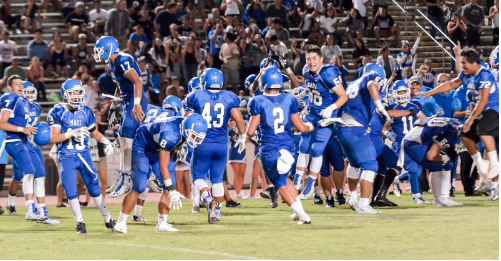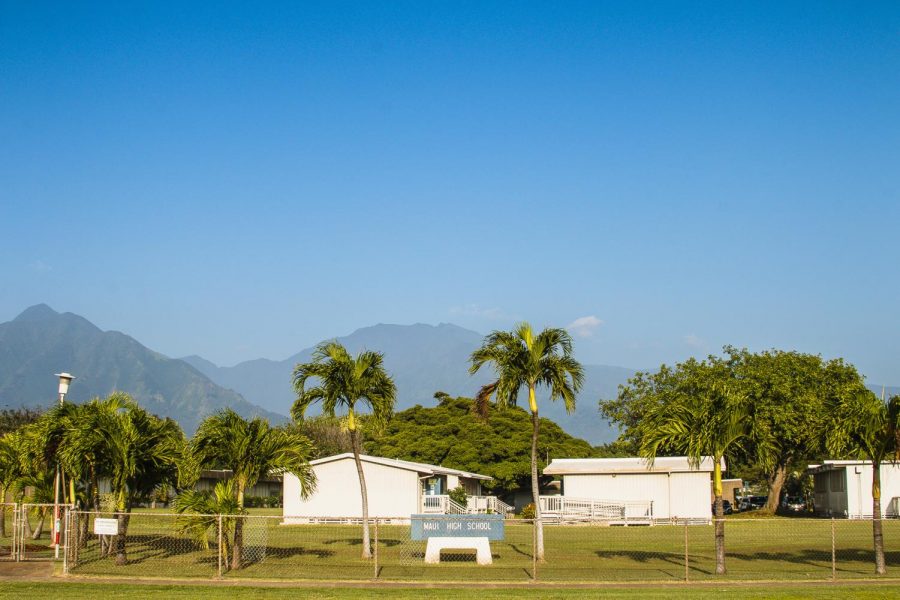Nosey Notes: Maui, Hawaii
November 6, 2017
As a high school student, it can be easy to isolate yourself from the vast world and boundless opportunities it holds. Many students get stuck in the small bubble of their hometown, forgetting how different the lives of others are. They get looped in a constant routine of school, without exploring the world and seeing how others live. However, it is important to remember how extensive our world, even our own country, really is. Hence, The Nosey Notes. The Nosey Notes allows students, or anyone, to catch a glimpse of the lives of high school students living all around the world.
I had the opportunity to interview Marcus Tabon, a student at Maui High School, located in Maui, Hawaii. I was fascinated with the idea of attending school in Hawaii, the most remote place in the world. Normally thought of as a vacation paradise, at times I forget it is also home too many.
A typical school day in paradise goes a little something like this:
School starts at 7:55, followed by the first two blocks of the day, period A and B, which are an hour and 55 minutes each. Then students get to enjoy a 15 minute morning recess, where they can relax outside or find a safe haven in an air conditioned classroom. Since Maui High is primarily an outdoor campus, Marcus says throughout the day “You’re probably walking on grass 80% of the time”. Also during morning recess students have the option to order hot breakfast, and eat in the cafeteria. Following are periods C and D, which are each 55 minutes long. Next is a 30 minute lunch, coupled with a 15 minute recess. Finally, the day concludes with period E which is approximately one hour long.
After school there are a variety of sports one can choose to participate in including, surfing, paddling, riflery, soccer, football, bowling, water polo, and just about any other sport imaginable. Certainly two of the most unique sports at Maui High are surf team and paddling. To make the surf team, participants must first pass a swim test. To pass, they must swim the length of the beach, which is generally a quarter mile, in 5 minutes of less. Marcus emphasized the immense dangers of surf team, as the ocean can be unpredictable. Marcus and his classmates agreed that surfing is substantially more dangerous than football. Marcus also added that “surprisingly there are a lot of kids who don’t know how to swim here”, which presents dangers in itself. Once you pass the swim test, practices are held daily after school. The team travels all around the island, weather dependent, to different beaches. The day before a surf competition, the team will travel to the beach the competition is being held at. They hold mock heats and surf until sunset, getting accustomed to the course. As for the day of the competition, Marcus explains that “Everybody has a blast at the surf comps. It’s such a small island that everybody knows each other”. Another sport unique to Hawaii is paddling. Practices rotate between weight training, running, and paddling, all on the beach. During competitions, Maui’s paddling team competes against other teams on the island in speed. When asked what the most popular sport is at Maui High, Marcus responded saying definitely track and football, much like at Pentucket.
Now, being the most remote place in the world, who do Hawaii’s high school athletes compete against? Marcus explained that first the teams compete against other Maui schools, until they win their division. Then the team competes in states, which is against all the other division winners in Hawaii. Finally, the teams can go to the championships which is held on the mainland against other mainland teams.
I also wondered about some of the differences between attending school in Hawaii versus the mainland. Marcus believes one of the largest differences is that, “there is a lot less pressure being put on kids here”. He says an average junior has around an hour of homework a night, and about two hours a night if you take Advanced Placement courses. Marcus also added one of the huge differences he has noticed is the lack of bullying at Maui High; “Since I’ve been here I have not seen one person get bullied. It is really shunned upon, especially with the whole idea of ‘aloha’ and stuff. Pretty much anybody who tries to bully someone gets put in their place”.
Next I asked if he and other students feel they have less job opportunities, as opposed to kids on the mainland. Marcus replied saying “the amount of creative job opportunities here compared to the mainland is minuscule.” He believes that the small size of the island can certainly at times be a disadvantage to students. A lot of graduating students do not want to go into tourism after high school, which is one of the only stable jobs in Hawaii. Marcus finds a lot of students, once they graduate high school, will move to the mainland to go to college. He further adds that if someone goes to a good college, they have to opportunity to move back if they can acquire a government job, such as working in the town hall.
One unique aspect of living on Maui is the immense pride associated with what side of the island you live in. Marcus states that,“People will yell out their zip codes and their streets” and “Everybody is really prideful of where they live”.
Lastly, I asked what the best part about living in Hawaii is. Unsurprisingly, Marcus replied the weather. With such great weather, Marcus and other high school students go to the beach everyday, and if they have a busy week, every other day. Sometimes students will bring their surfboards in the back of their cars to school, and go directly to the beach after school.
Overall living and attending school in Hawaii truly does sound like paradise. There is a much larger emphasis for students to just enjoy life, rather than constant pressures to perform highly in school. Also, students are given small recesses throughout the day, which allows students to decompress during the school day. Furthermore, with the spirit of ‘aloha’, students are always kind to one another, which makes Maui High an enjoyable and safe space for all students. Lastly, most students go to the beach everyday, and it does not get much better than that.
A special thank you to Clint Gima from Maui High School for organizing this interview and to Marcus Tabon for allowing readers of The Pentucket Profile to catch a glimpse into his life.



Tess Beech • Dec 13, 2017 at 1:09 pm
Well done Cassie! While reading this article I thought it was very well written. It was very interesting to learn about a school in Hawaii and there daily schedule. Every time I think about Hawaii I just think about vacationing there, so It’s interesting to know they have students who play the same sports we do like track and football but, they also have a surf team as well which is very cool to me. Overall a very well written piece!
-Tess Beech
Mr Mac • Nov 19, 2017 at 8:45 pm
Nice write up, Cassandra! Please contact me to set up a potential skype video call with Maui High school. We are looking for networking opportunities to discuss and share STEM projects and possibly a student exchange program! Great work,
Mr. MacDonald
[email protected]